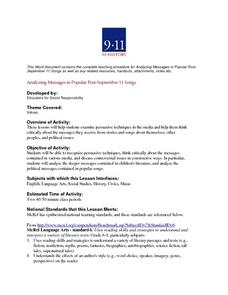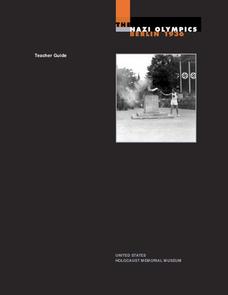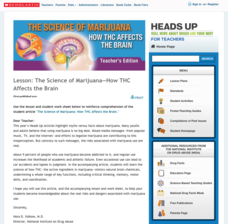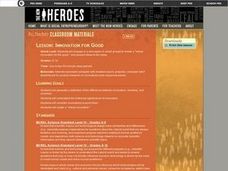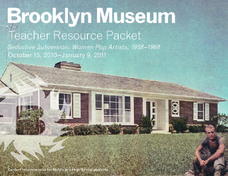Curated OER
911 As History
Students recognize persuasive techniques, think criticaly about the messages contained in various media, and discuss controversial issues in constructive ways. They analyze the deeper messages contained in children's literature, and...
US Holocaust Museum
Nazi Olympics: Berlin 1936
The Olympics are about more than sports—at times, the games are also a place of racism and prejudice! Pupils investigate the 1936 Olympics in Berlin, Germany. They analyze the meaning behind the materials included in the United States...
Curated OER
Power, Persuasion & Propaganda: Exploring Multiple Motives
Students recognize different motives even in non-commercial media. They analyze the role of media in a democratic society and wrestle with ethical issues concerning media and the public good. They create a media message with one or more...
Curated OER
Scientific Detectives
Students examine the legitimacy of advertisers' claims about products using science and critical thinking. They view and discuss ads, read a case study, and conduct an experiment to demonstrate whether a product lives up to its claims.
Curated OER
The Big Mo
Young scholars develop media literacy and critical thinking skills to analyze trends and determine the extent to which their decisions may be influenced by manipulation. They examine the mathematics of trends and write about a time they...
Foreign Policy Research Institute
Teaching the 9/11 Anniversary
Here is a lesson on terrorism and 9/11. While outdated, it could be easily revised for today's teens. It includes targeted vocabulary, a background information activity, critical thinking questions, and step-by-step procedures for...
Curated OER
Creating Scrolls Based on the illustrated TALE OF GENJI
Learners identify formal elements that characterize the scroll, work in a variety of media, from traditional to digital, to create their own scrolls, work into digital printout with at least two media, and engage in meaningful critiques...
Curated OER
Stereotypes: More Than Meets the Eye
Young scholars explore the concept of stereotyping. They observe images and media that portray the Middle East and its inhabitants. Students make determinations about the impact of the images on their perceptions. They consider ways...
Curated OER
Divorce And Stepfamilies: Breaking Apart, Coming Together
Students view a PBS "In the Mix" video about the challenges teens face when their parents divorce and/or remarry. They participate in a class discussion about the video, role-play related situations and explore media depictions of...
Curated OER
Objective Versus Subjective
Students examine the difference between subjective and objective statements, newscasts, and media. They discover that subjective is opinion based and objective is fact based.
Power Show
Introduction to Out of the Dust
Powerful images set the stage for Karen Hesse's historical fiction novel, Out of the Dust. The photos, maps, quotes from the text, critical thinking questions, and background information on the Dust Bowl period are all included, and will...
Curated OER
Growing a Citizen
Students analyze messages and values associated with civic engagement present in the media. They analyze the local community's promotion of values associated with civic engagement by conducting investigative research. They hypothesize...
Beacon Learning Center
Spotted Stones Linked Just Right
Discover how to play the game of dominoes using mental math skills to solve equations that earn points. Pupils become fast critical thinkers in determining which unknown addend tally up points in their favor.
Curated OER
Whose History Is It Anyway? Patterns in History
Read and examine primary source material in order to analyze, synthesize, and debate information about the Great Depression. Critical analysts research various source materials related to the Great Depression. They work in teams to...
Scholastic
The Science of Marijuana—How THC Affects the Brain
Marijuana can affect every part of a user's life—starting with the delicate nervous centers of the brain. An informative article and worksheet prompt teenagers to learn more about how the THC found in most forms of marijuana can...
Teaching Tolerance
Film Festival
Everybody's a critic—even your pupils! Using the included resources as a guide, screen films related to social justice and ask film enthusiasts to critique them. Publish the reviews for your school community or develop a film festival...
The New York Times
'The Century's Bitterest Journalistic Failure'? Considering Times Coverage of the Holocaust
Rich with primary sources and additional resources, this plan asks class members to think critically about newspaper coverage of the Holocaust. Focusing in particular on the analysis of the article "150th Anniversary: 1851-2001: Turning...
Curated OER
Innovation for Good
Many historical innovations were created for the common good. Get your students ready for life as a critical thinker with this lesson which defines the differences between innovation and invention. They will conduct Internet research,...
Curated OER
Evaluating the Strength of Scientific Evidence: The Rediscovery of the Ivory-billed Woodpecker
A happy discovery occurred in Arkansas in 2004: a woodpecker, believed to be extinct since the 1940s, reappeared! Or did it? Middle to high school ecologists examine scientific evidence and use critical-thinking skills to determine...
Brooklyn Museum
Seductive Subversion: Women Pop Artists, 1958–1968
What role did women play in pop art during the 1950s and 1960s? The class researches the role of women in mid-century America and how those roles were portrayed through the pop art of the time. They use an excellent set of...
Curated OER
Lesson Plan Outline for Rainbow Science
Young scientists study light reflection and refraction as they determine the critical angle, the rainbow angle, and color separation in rainbows. Teams record the data they collect in a shared spreadsheet and discuss results with the class.
J. Paul Getty Trust
Tag: Whose Values
Get young people thinking about their lives and current topics of social justice, advocacy, gender, race, and identity. After examining several works by Barbara Kruger, participants select a tag with one of the questions printed on it,...
College Board
1999 AP® English Language and Composition Free-Response Questions
A released Advanced Placed exam provides scholars with an opportunity to practice their English language and composition skills. After reading two passages about Florida's Okefenokee Swamp, they write essays analyzing how the distinctive...
Curated OER
Breaking News English: Rappers
In this rappers worksheet, students read the article, answer true and false questions, complete synonym matching, complete phrase matching, complete a gap fill, answer short answer questions, answer discussion questions, write, and more...


